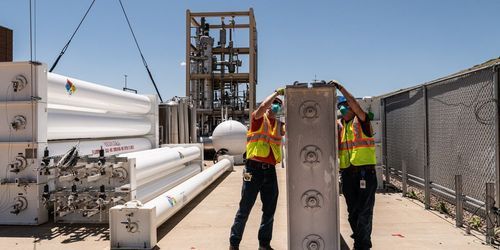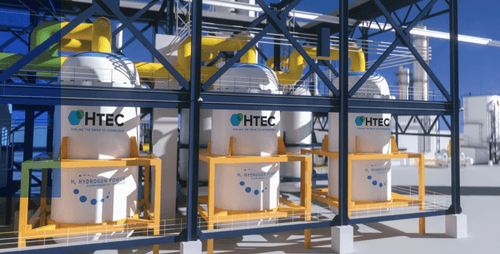Passage of the Inflation Reduction Act ignited investor interest in the global market for clean hydrogen and derivatives like ammonia and methanol, but offtake demand would be better characterized as a flicker.
And while many questions about the nascent market for green hydrogen remain unanswered, one thing is clear: offtakers seem uninterested in paying a “green premium” for clean fuels.
That doesn’t mean offtakers aren’t interested in using clean fuels – quite the opposite. As many large industrial players worldwide consider decarbonization strategies, hydrogen and its derivatives must play a significant role.
Carbon pricing tools such as the Carbon Border Adjustment Mechanism in Europe could introduce a structural pricing premium for clean products. And industry participants have called for carbon levies to boost clean fuels, most recently Trafigura, which released a white paper today advocating for a carbon tax on fossil-based shipping fuels.
But the business case for clean fuels by itself presents an element of sales risk for potential offtakers, who would have to try to pass on higher costs to customers. Even so, there is an opportunity for offtakers to make additional sales and gain market share using decarbonization as a competitive advantage while seeking to share costs and risks along the value chain.
“It’s a very difficult sell internally to say we’re going to stop using natural gas and pay more for a different fuel,” said Jared Elvin, renewable energy lead at consumer goods company Kimberly-Clark. “That is a pickle.”
Needing clean fuels to reach net zero
Heavy-duty and long-haul transportation is viewed as a clear use case for clean fuels, but customers for those fuels are highly sensitive to price.
“We’re very demand focused, very customer focused,” said Ashish Bhakta, zero emission business development manager at Trillium, a company that owns the Love’s Travel Shop brand gas stations. “That leads us to be fuel-agnostic.”
Trillium is essentially an EPC for fueling stations with an O&M staff for maintenance, Bhakta said.
As many customers consider their own transitions to zero-emissions, they are thinking through EV as well as hydrogen, he said. Hydrogen is considered better for range, fueling speed and net-payload for mobility, all of which bodes well for the clean fuels industry.
One sticking point is price, he said. Shippers are highly sensitive to changes in fuel cost – and asking them to pay a premium doesn’t go far.
Alessandra Klockner, manager of decarbonization and energy solutions manager at Brazilian mining giant Vale, said her employer is seeking partnerships with manufacturers, particularly in steel, to decarbonize its component chain.
In May Vale and French direct reduced iron (DRI) producer GravitHy signed an MoU to jointly evaluate the construction of a DRI production plant using hydrogen as a feedstock in Fos-sur-Mer, France. The company also has steel decarbonization agreements in Saudi Arabia, the UAE and Oman.
In the near term, 60% of Vale’s carbon reductions will come from prioritizing natural gas, Klockner said. But to reach net zero, the company will need clean hydrogen.
“There’s not many options for this route, to reach net zero,” she said. “Clean hydrogen is pretty much the only solution that we see.”
Elvin, of Kimberly-Clark, noted that his company is developing its own three green hydrogen projects in the UK, meant to supply for local use at the source.
“We’re currently design-building our third hydrogen fueling facility for public transit,” he said. “We’re basically growing and learning and getting ready for this transition.”
The difficulty of a “green premium”
The question of affordability persists in the clean fuels space.
“There are still significant cost barriers,” said Cihang Yuan, a senior program officer for the World Wildlife Fund, an NGO that has taken an active role in promoting clean fuels. “We need more demand-side support to really overcome that barrier and help users to switch to green hydrogen.”
Certain markets will have to act as incubators for the sector, and cross-collaboration from production to offtake can help bring prices down, according to Elvin. Upstream developers should try to collaborate early on with downstream users to “get the best bang for your buck” upstream, as has been happening thus far, he added.
Risk is prevalently implied in the space and must be shared equitably between developers, producers and offtakers, he said.
“We’ve all got to hold hands and move forward in this, because if one party is not willing to budge on any risk and not able to look at the mitigation options then they will fail,” he said. “We all have to share some sort of risk in these negotiations.”
The mining and steel industries have been discussing the concept of a green premium, Klockner said. Green premiums have actually been applied in some instances, but in very niche markets and small volumes.
“Who is going to absorb these extra costs?” she said. “Because we know that to decarbonize, we are going to have an extra cost.”
The final clients are not going to accept a green premium, she said. To overcome this, Vale plans to work alongside developers to move past the traditional buyer-and-seller model and into a co-investment strategy.
“We know those developers have a lot of challenges,” she said. “I think we need to exchange those challenges and build the business case together. That’s the only way that I see for us to overcome this cost issue.”








